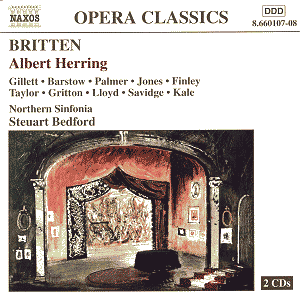I did not take to Albert Herring when I first
heard it. Listening to it again in the form of this recording
of 1996, now re-launched by Naxos at bargain price, I have been
somewhat disarmed.
My problem concerned the story which pivots on
the one idea of a lad being elected May Queen because all the
girls of the town have suspect moral credentials. Ho! ho! The
tale is French in origin – a Guy de Maupassant story – which reminds
me of a British television comedy serial many years ago that was
set in a small French town. Again, there was only one idea. In
this case it centred on the plans to erect (yes, I’m afraid the
word was repeatedly used with obvious innuendo) a pissoire
in the town square. It was desperately unfunny and deservedly
bombed. Yet I met people who claimed thy fell about throughout.
Likewise, there are those who find Albert Herring
a great laugh and more than once have I read it described as the
finest English operatic comedy. Well let’s face it, there is not
much competition. There are others who have attempted to raise
the work’s status by investing it with depth of content, citing
Albert as an example of one of Britten’s outsiders along with
Peter Grimes, Owen Wingrave et al. And then there are the themes
of liberation and lost innocence. Be such things as they may,
they will not make the show any funnier.
Yet a great composer with a feeling for people
and the stage is capable of turning unpromising material into
something worthwhile if not inspiring. Take Così
fan tutte, for example. Like Mozart, Britten, saves the day
with keen characterisation enabled by music of wit and charm,
beautifully wrought for chamber orchestral forces. The librettist,
Eric Crozier skilfully transposes the story to Suffolk so can
indulge themes of English hypocrisy, pomposity and small town
parochialism, not mention the inevitable one of class.
This recording was made in Newcastle upon Tyne
in 1996 with the city’s own orchestra, the Northern Sinfonia,
a chamber ensemble tailor-made for this sort of music and they
play magnificently. There is a crack British cast of huge collective
experience and a real feeling of ensemble effort prevails. It
is a studio recording (a suburban church in fact) and as a result
I feel that the singers are attempting to portray their stereotypical
characters with a particular vocal focus to compensate for the
inability to be able to use acting and stage presence. This can
lead to a tendency to over caricature but that will be a matter
of taste. The main rival recording, a Chandos production made
later in 2001 under Richard Hickox takes, on the whole, a more
steady view of characterisation, aiming perhaps for a greater
degree of verismo [see
review]. There is a different but equally distinguished cast
and the playing of the City of London Sinfonia is also excellent.
One key difference though is the portrayal of the key role of
Lady Billows. On the Chandos version this is Susan Bullock, who,
although a budding Wagnerian, does not match the authority of
Josephine Barstow’s performance on Naxos. Barstow takes the demands
of pomposity, intimidation, stridency and occasional lyricism
in her stride and at the same time maintains musicality. Her tendency
to a wide vibrato, sometimes subject of criticism in some of her
roles, works well in this part.
There are delicious moments. For example Lady
Billows’ entrance towards the second scene of Act I, with entourage
in tow – We bring great news to you - sounds like a triumphant
military assault in Barstow’s portrayal. However Britten’s music,
with its strumming harp chords just manages to avoid overdosing
on ironic pomposity. One of the more remarkable passages from
a characterisation point of view is in Act 2 where all the personnel
are involved apart from Albert who is the passive subject of the
proceedings at the start of a village banquet celebration in a
marquee. Twelve people are involved. We go from a beautiful little
duet between Sid and Nancy who are making preparations, through
to the entrance of all the other characters and the beginning
of the celebrations. Each person sings snippets supported by music
that is designed to convey their individual characters. The vicar
and Lady B swoon lyrically at the triumph of virtue (and the success
of their own plans) to music of beauty without sentimentality.
The children sing a brief celebratory hymn and all fall into chaotic
chatter. In the space of a few minutes Britten composes a passage
that copes with radical change of mood and pace while throwing
in musical vignettes of the contrasting personalities. Yet it
is seamlessly through-composed and maintains an inexorable forward
momentum. This is a great operatic craftsman at work and the music
is performed with a real sense of virtuoso ensemble.
The alternative Chandos recording, with a varying
set of merits, is also distinguished enough to make it difficult
to rank the two for overall performance. If cost-effectiveness
considerations are important to you, then the Naxos production
is such an opera bargain that it has to prevail. The recording
quality is excellent although I sometimes found the singers a
little too up-front but then it is a people opera. If, like me,
you have reservations about the opera’s plotting, this disc could
still enable you, like me, to be carried along by the infectious
music and the sheer operatic craft of it all.
John Leeman
